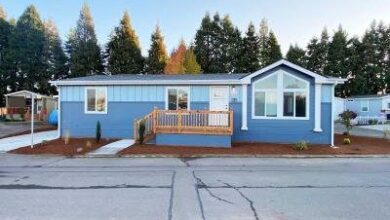Oregon Homes for Sale: Your Dream Home in the Beaver State
Oregon Homes for Sale – Welcome to our comprehensive guide to finding the perfect home in Oregon! If you’re considering moving to this beautiful state, you’ve come to the right place. In this article, we’ll provide you with all the information you need to know about Oregon homes for sale. From the diverse real estate market to the stunning landscapes that surround these properties, we’ll cover it all. So, let’s dive in and start your journey towards finding your dream home in Oregon!
As you begin your search for the perfect home in Oregon, it’s important to understand the unique aspects of the state’s real estate market. From charming coastal towns to vibrant cities and picturesque mountain communities, Oregon offers a wide range of options for homebuyers. Whether you’re looking for a cozy cottage near the coast or a spacious modern home in the heart of a thriving city, you’ll find it here.
Exploring the Different Regions of Oregon
Oregon is divided into several distinct regions, each with its own unique characteristics and real estate offerings. Let’s take a closer look at some of the different regions you can consider when searching for a home in Oregon:
1. Portland Metro Area
The Portland metro area is known for its vibrant cultural scene, thriving economy, and diverse neighborhoods. From the trendy Pearl District to the family-friendly suburbs of Beaverton, there’s something for everyone in this bustling region.
2. Willamette Valley
The Willamette Valley is famous for its fertile farmlands, picturesque vineyards, and charming small towns. If you’re a wine enthusiast or enjoy a more laid-back lifestyle, this region might be the perfect fit for you.
3. Central Oregon
Central Oregon offers a unique blend of outdoor recreational opportunities and a vibrant arts and culture scene. From the stunning landscapes of Bend to the ski resorts of Mt. Bachelor, this region attracts nature lovers and adventure seekers alike.
4. Southern Oregon
Southern Oregon boasts a mild climate, abundant natural beauty, and a thriving arts community. With its proximity to the California border, this region offers a more relaxed pace of life and access to outdoor activities such as hiking, fishing, and rafting.
5. Oregon Coast
The Oregon Coast is known for its breathtaking views, charming beach towns, and outdoor recreational opportunities. Whether you’re looking for a beachfront getaway or a coastal community to call home, the Oregon Coast has plenty to offer.
6. Eastern Oregon
Eastern Oregon is a region of vast open spaces, stunning mountain ranges, and charming small towns. If you’re seeking a quieter, more rural lifestyle, this region might be the perfect fit for you.
The Benefits of Living in Oregon
Moving to Oregon offers a multitude of benefits, making it an attractive destination for homebuyers. Let’s explore some of the advantages of living in the Beaver State:
1. Natural Beauty
Oregon is renowned for its stunning natural beauty, with diverse landscapes ranging from rugged coastlines to lush forests and majestic mountains. Living in Oregon means having easy access to outdoor recreational activities such as hiking, skiing, and fishing.
2. High Quality of Life
Oregon consistently ranks high in terms of quality of life, with factors such as low crime rates, excellent healthcare, and a strong sense of community. The state’s commitment to sustainable living and environmental conservation also contributes to a high quality of life for its residents.
3. Thriving Arts and Culture Scene
Oregon is home to a vibrant arts and culture scene, with numerous galleries, theaters, and music venues. Whether you’re a fan of visual arts, live performances, or music festivals, you’ll find plenty of opportunities to immerse yourself in the arts in Oregon.
4. Strong Economy
Oregon’s economy is robust and diverse, with thriving industries such as technology, healthcare, and manufacturing. The state offers ample employment opportunities and a strong entrepreneurial spirit, making it an ideal place to live and work.
5. Progressive Values
Oregon is known for its progressive values and commitment to social and environmental causes. If you’re passionate about issues such as sustainability, equality, and social justice, you’ll feel right at home in Oregon.
Types of Properties Available in Oregon
When it comes to buying a home in Oregon, you’ll find a wide variety of property types to choose from. Whether you prefer a single-family home, a condo, or a townhouse, Oregon has options to suit every lifestyle and budget. Let’s explore some of the different property types you can consider:
1. Single-Family Homes
Single-family homes are the most common type of property in Oregon. These homes offer privacy, space, and the opportunity to have your own yard. Whether you’re looking for a cozy cottage or a spacious modern home, you’ll find a range of options in Oregon.
2. Condos and Apartments
If you prefer a low-maintenance lifestyle or want to live in the heart of a vibrant city, condos and apartments are a popular choice. These properties often offer amenities such as fitness centers, swimming pools, and 24-hour security.
3. Townhouses
Townhouses offer a balance between the privacy of a single-family home and the convenience of a condo. They are often part of a larger complex and offer shared amenities such as gardens or playgrounds.
4. Manufactured Homes
Manufactured homes, also known as mobile homes, are an affordable housing option in Oregon. These homes are built in a factory and then transported to a specific site. They can be a great choice for those looking for a more budget-friendly option.
5. Luxury Homes
If you’re in the market for a high-end property, Oregon also offers a selection of luxury homes. From waterfront estates to mountain retreats, these homes feature top-of-the-line amenities and breathtaking views.
Understanding the Real Estate Market in Oregon
Before starting your search for a home in Oregon, it’s crucial to have a good understanding of the current real estate market. Let’s take a closer look at some key factors to consider:
1. Average Home Prices
The average home prices in Oregon vary depending on the region and the type of property. In areas like Portland, prices tend to be higher, while more rural regions may offer more affordable options. It’s important to have a clear budget in mind before beginning your search.
2. Inventory Levels
The inventory levels in Oregon can fluctuate, with some areas having a higher demand for housing than others. It’s important to stay informed about the current inventory levels to understand the competition and make more informed decisions.
3. Popular Neighborhoods
Each region in Oregon has its own popular neighborhoods, offering different amenities and lifestyle options. Researching the most sought-after neighborhoods in the area you’re interested in will help you narrow down your search and find the perfect community.
4. Market Trends
Understanding the current market trends can give you insights into whether it’s a buyer’s or seller’s market. This knowledge can help you determine the best time to make an offer and negotiate with sellers.
Navigating the Homebuying Process in Oregon
Buying a home is a significant investment, and navigating the homebuying process can be daunting. Let’s break down the steps involved in purchasing a home in Oregon:
1. Determine Your Budget
Before starting your search, it’s essential to determine your budget. This involves assessing your financial situation, getting pre-approved for a mortgage, and considering additional costs such as closing fees and property taxes.
2. Find a Real Estate Agent
Working with a knowledgeable real estate agent can make the homebuying process much smoother. They can help you find suitable properties, negotiate offers, and guide you through the paperwork involved in closing a deal.
3. Search for Properties
Once you’ve determined your budget and enlisted the help of a real estate agent, it’s time to start searching for properties. You can utilize online listings, attend open houses, and explore different neighborhoods to find the right home for you.
4. Make an Offer
When you find your dream home, it’s time to make an offer. Your real estate agent will help you draft a competitive offer that takes into account factors such as the current market conditions and the seller’s expectations.
5. Home Inspections
After your offer is accepted, it’s crucial to have a home inspection to identify any potential issues with the property. A professional inspector will thoroughly examine the home, providing you with a comprehensive report that can help you make informed decisions.
6. Negotiate and Finalize the Deal
Once the home inspection is complete, you may need to negotiate any repairs or adjustments with theseller. Your real estate agent will guide you through this process and help you reach a mutually beneficial agreement. Once all negotiations are finalized, you’ll move forward with finalizing the deal by signing the necessary paperwork and arranging for the transfer of funds.
7. Closing the Deal
The final step in the homebuying process is the closing. This is where all the legal and financial aspects of the transaction are completed. You’ll sign the necessary documents, pay closing costs, and officially take ownership of the property. Your real estate agent and closing attorney will ensure that all the necessary steps are followed and that the closing process goes smoothly.
Choosing the Right Neighborhood
Choosing the right neighborhood is crucial when searching for a home in Oregon. Here are some factors to consider when evaluating different neighborhoods:
1. Proximity to Amenities
Consider what amenities are important to you and how conveniently located they are to the neighborhood you’re considering. This could include schools, grocery stores, parks, restaurants, and entertainment options.
2. Safety and Security
Research the safety and crime rates in the neighborhoods you’re interested in. Look for areas with a low crime rate and a strong sense of community. Online resources and local police departments can provide valuable information in this regard.
3. School Districts
If you have children or plan to start a family, the quality of the school district may be an important factor to consider. Research the rankings and reputation of the schools in the area to ensure they meet your expectations.
4. Community Vibe
Visit the neighborhoods you’re considering at different times of the day to get a sense of the community vibe. Talk to residents and attend local events to gain insights into the neighborhood’s character and whether it aligns with your lifestyle and values.
5. Future Development
Consider any future development plans for the neighborhood. This could include new infrastructure, commercial developments, or zoning changes. Understanding the potential for growth or changes in the area can help you make a more informed decision.
Working with a Real Estate Agent in Oregon
Partnering with a real estate agent who is knowledgeable about the Oregon market can greatly simplify your homebuying journey. Here’s why working with a real estate agent is beneficial:
1. Local Expertise
A real estate agent who specializes in the Oregon market will have in-depth knowledge about the different neighborhoods, market trends, and property values. They can provide valuable insights and guidance throughout the buying process.
2. Access to Listings
Real estate agents have access to a wide range of listings, including properties that may not be publicly available. They can help you find homes that meet your criteria and arrange viewings, saving you time and effort in your search.
3. Negotiation Skills
Experienced real estate agents are skilled negotiators who can help you secure the best possible price and terms for your desired property. They will advocate for your interests and ensure that your offer is competitive in the current market.
4. Guidance through the Process
Buying a home involves a lot of paperwork, legal processes, and deadlines. A real estate agent will guide you through each step, ensuring that all necessary documents are completed accurately and submitted on time.
5. Industry Connections
A real estate agent has a network of professionals, including lenders, home inspectors, and attorneys, whom they can recommend to assist you throughout the homebuying process. These connections can help streamline the process and ensure a seamless transaction.
Financing Options for Buying a Home in Oregon
Unless you’re purchasing a home outright, you’ll likely need to explore financing options. Here are some common financing options available in Oregon:
1. Conventional Loans
Conventional loans are the most common type of mortgage and are offered by banks and other financial institutions. They typically require a down payment of at least 20% and have varying interest rates and terms.
2. FHA Loans
The Federal Housing Administration (FHA) offers loans with more lenient qualification requirements, making them a popular choice for first-time homebuyers. FHA loans typically require a lower down payment and have more flexible credit score requirements.
3. VA Loans
VA loans are available to eligible veterans, active-duty service members, and their spouses. These loans are guaranteed by the Department of Veterans Affairs and offer competitive interest rates and flexible qualification criteria.
4. USDA Loans
The United States Department of Agriculture (USDA) offers loans for rural and suburban homebuyers who meet certain income and property location requirements. USDA loans often have low or no down payment options.
5. Down Payment Assistance Programs
Oregon offers various down payment assistance programs to help homebuyers with limited funds for a down payment. These programs provide grants or loans to help cover a portion of the down payment and closing costs.
The Importance of Home Inspections
Before finalizing your home purchase, it’s crucial to have a thorough home inspection. Here’s why home inspections are important:
1. Identifying Potential Issues
A home inspection allows a qualified professional to assess the condition of the property and identify any potential issues. This may include structural problems, plumbing or electrical issues, or the presence of mold or pests.
2. Negotiating Repairs or Price Adjustments
If the inspection reveals any significant issues, you can negotiate with the seller to address these concerns. You may request repairs to be completed before closing or request a price adjustment to account for the cost of necessary repairs.
3. Peace of Mind
A thorough home inspection provides peace of mind, knowing that you’re making an informed decision about the condition of the property. It helps you understand the potential maintenance or repair costs that may arise after purchasing the home.
4. Assessing Safety Hazards
Home inspections also help identify any safety hazards that may be present in the property. This includes issues such as faulty wiring, inadequate ventilation, or the presence of hazardous materials like asbestos or lead paint.
5. Planning for Future Maintenance
The inspector’s report can provide valuable insights into the maintenance needs of the property. This allows you to plan and budget for future maintenance and repairs, ensuring the long-term sustainability of your investment.
Making Your Offer and Closing the Deal
Once you’ve found your dream home, it’s time to make an offer and close the deal. Here’s what you need to know:
1. Making a Competitive Offer
Your real estate agent will help you draft a competitive offer based on market conditions and the seller’s expectations. This includes determining an appropriate purchase price, contingencies, and any additional terms or conditions.
2. Negotiating the Purchase Agreement
Once your offer is submitted, the seller may accept it, reject it, or counteroffer. Negotiations may involve factors such as purchase price, closing date, repair requests, or contingencies. Your real estate agent will guide you through this process to reach a mutually acceptable agreement.
3. Finalizing the Financing
After your offer is accepted, you’ll work with your lender to finalize your financing. This involves providing any additional documentation required, completing the loan application process, and satisfying any conditions set by the lender.
4. Conducting a Title Search
A title search is conducted to ensure that the property’s title is clear and free of any liens or encumbrances. This step is crucial to protect your ownership rights and ensure a smooth transfer of the property’s title to your name.
5. Home Insurance and Closing Costs
Prior to closing, you’ll need to secure home insurance coverage for the property. Additionally, you’ll need to gather the necessary funds to cover closing costs, which may include fees for the lender, title company, and other third parties involved in the transaction.
6. The Closing Process
During the closing, you’ll review and sign all the necessary documents, including the closing disclosure, loan documents, and the deed. You’ll also pay the remaining closing costs and receive the keys to your new home. Your real estate agent and closing attorney will guide you through this process to ensure a smooth and successful closing.
In conclusion, Oregon offers a wide array of homes for sale, each with its own unique charm and appeal. By understanding the different regions, the real estate market, and the homebuying process, you’ll be well-equipped to find your perfect home in this beautiful state. Remember to work with a knowledgeable real estate agent, conduct thorough inspections, and carefully navigate the closing process. With careful consideration and guidance, you can make your dream of owning an Oregon home a reality!









